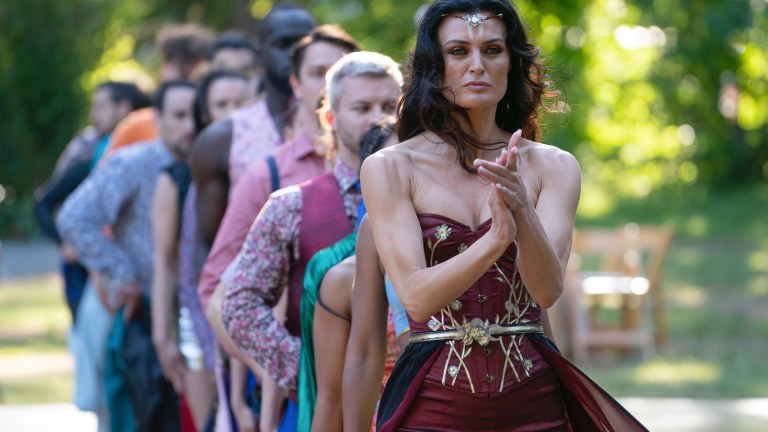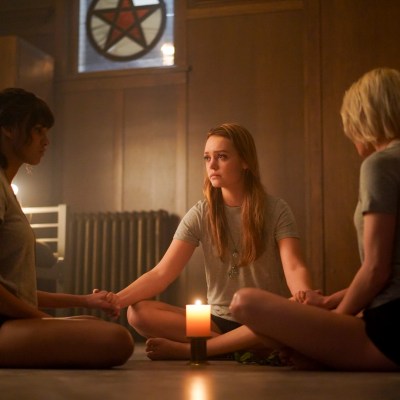Motherland: Fort Salem Episode 4 Review – Hail Beltane
The witches of Fort Salem take comfort in ritual and custom, after a shocking death threatens to sully Beltane.

This Motherland: Fort Salem review contains spoilers.
Motherland: Fort Salem Episode 4
Witches can’t seem to get a break. Not from the constant onslaught of Spree attacks, and not from tumult in-house. Fort Salem is still reeling from the sudden death by suicide of (Scylla’s ex-boyfriend) Porter. Not knowing whether it was an attack by the Spree, Petra Bellweather (Abigail’s highly-decorated mother) and others suggest General Alder cancel Beltane festivities. But it is a sacred day, and an important ritual, and she refuses to give up those customs because, who are they without them. They carry on with the festival as planned, but continue to investigate the Spree’s potential influence in Fort Salem.
People on base celebrate Raelle for her heroic attempt to save Porter’s life. Even though she wasn’t able to, her innate talent for healing was revealed. We know she’s capable —when we meet her in the series premier, she’s taking someone’s pain away— but this may be the first time her peers and teachers get a glimpse of her power. Her attempt to save Porter leaves her able to feel what he felt in his last minutes, and eventually see the last things he saw. She could sense his fear, and see bits of his confrontation with Scylla.
When Raelle confronts Scylla about whether she saw Porter that night, she deflects. Scylla manipulates and gaslights Raelle, much the same as she did with Porter before she pushed him, and it’s stunning to watch. Some may think of gaslighting as a type of emotional violence that happens to women by men, and that’s how it’s often framed. But it can happen in reverse, and it can and does happen, between people of different gender expressions, and sexual identities.
Women are capable of perpetrating that kind of violence, and while it’s upsetting from a character POV, it’s always fun as a viewer to see women be wicked. Scylla gets to be cunning and manipulative because she isn’t the only woman on the show, and doesn’t have to be an avatar for all types of women. She can be bad because she isn’t held up as the paragon of femininity and power. That’s one thing this show gets right. These characters aren’t drastic departures from their archetypes but they all embody something different and therefore reflect different facets of womanhood.
Scylla becomes panicked when her necro- professor tells her class they’ll be using the energy of Beltane to resurrect Porter. She remains on edge until Porter’s revived corpse fails to incriminate her, but the Spree don’t take kindly to cleaning up her messes. They threaten her to get invited to Abigail’s cousin’s wedding… or else. How is she supposed to be invited to a wedding her girlfriend was invited to as a guest of another guest? The Spree aren’t just ruthless, they also have no decorum.
There is nothing unpredictable about Scylla’s narrative trajectory, which would make her boring, if not for how she affects Raelle, who feels like the deeper character— despite Scylla being treated by the writing as the more soulful and enigmatic of the two. Her every move feels pre-ordained, and I suppose they are, and my fear is that the writing will never veer away from the clearly marked path that has been tread and retread time and again. I can already see the end of this story, and what a shame it would be if that vision came to pass.
Speaking of shame, witches have none, at least where sexuality is concerned. In the last episode, Tally fell head over heels for Gerit Buttonwood, and on the night of Beltane, “the dance” decides if they’re meant to be. They end the dance together (not without deliberate work on both their parts) and Tally’s witch mark changes color (she loses her virginity), which is a major milestone for a witch. Sex is important in this culture, it is associated with energy, and power. Being sexual doesn’t have a stigma; nobody bats an eye when Abigail, for example, takes two male lovers.
Every episode reveals a little more about witch culture, and subsequently military culture, for they are one and the same for American witches. There are questions that remain unanswered due to the insular nature of the setting. How mainstream is witch culture? Would the average civilian have passing knowledge of this culture in the same way we all kind of know what Christmas and Easter mean even if we aren’t Christian? Further, since witches have been a part of the military since the country’s inception, has their culture or religion influenced American culture, religion, or governance in any way?
There has to be a way to answer these questions without putting the audience through an American History lecture, but I doubt the show is going to give us more than the bare minimum of what is necessary to tell this specific story. It’s still hard to visualize the world of Fort Salem because we only get information in the context of how it affects a character. We can surmise from that, make deductions, but we don’t know. I don’t always mind vagueness, but this show feels like it’s set in a snow globe— like it only ever encompasses one space and one moment of time. The world needs to expand so the story and the characters have somewhere to go.
Additional thoughts:
- Abigail’s insecurity and need to be exceptional, for her mom and for the family, is ever so present when Petra is on base. I look forward to more exploration of that relationship.
- In addition to fleshing out the exterior world, I want the show to be more detailed about how sex, relationships, and familial units work.
Keep up with Motherland: Fort Salem news and reviews here.

